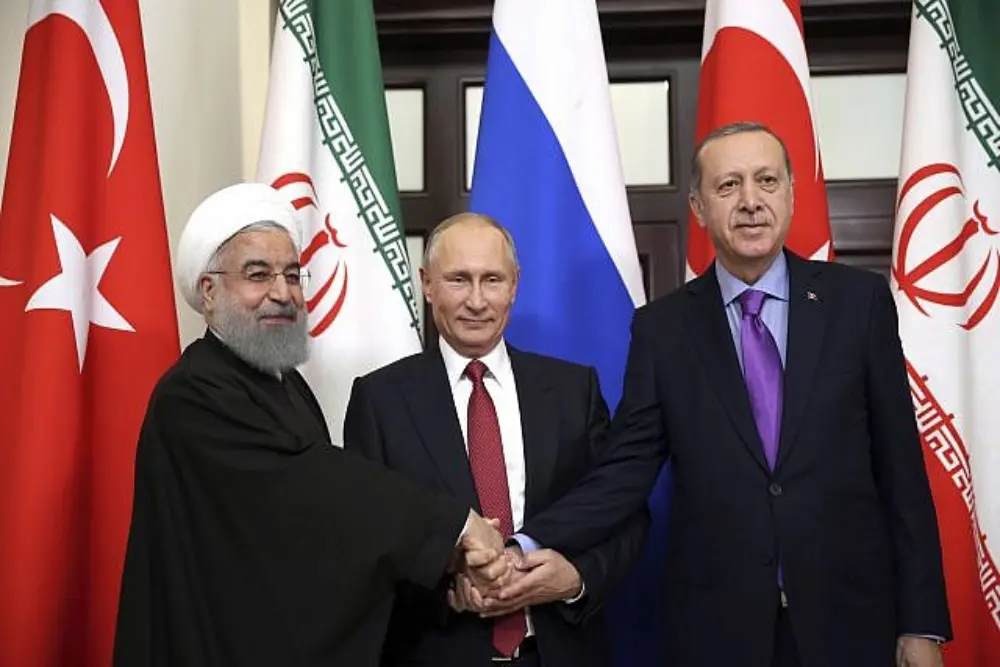
The Syrian conflict, entering its second decade, remains a focal point of Middle Eastern geopolitics, significantly influenced by the actions and interests of regional powers such as Turkey and Iran. Their involvement presents a complex interplay of competition, pragmatism, and strategic engagement. This article aims to analyze the Turkish-Iranian relations in Syria, delving into their historical context, strategic objectives, and evolving dynamics.
Historically, Turkey and Iran have shared a nuanced relationship characterized by cooperation and rivalry. In the Syrian context, their agendas are primarily shaped by differing regional aspirations and security concerns. Iran’s involvement is driven by its desire to preserve its ally, the Syrian government, which serves as a critical link in its “axis of resistance” strategy, enhancing its regional influence through a continuous corridor to the Mediterranean.
Meanwhile, Turkey is primarily focused on national security concerns, particularly the prevention of an autonomous Kurdish region along its border. The rise of Kurdish power in northern Syria, especially through the YPG, which Ankara associates with the PKK, poses a significant threat to its territorial integrity. Consequently, Turkey has supported various opposition groups as a counterbalance to both Kurdish and Syrian-held territories.
Despite their opposing goals, Turkey and Iran have found areas of convergence, largely out of necessity. Both countries are integral to the Astana Process, alongside Russia, aimed at facilitating dialogue and reducing hostilities in Syria. This cooperation underscores a pragmatic approach where both Ankara and Tehran recognize the utility of diplomatic engagement to manage their rivalries and achieve a degree of stability in the region.
However, conflicts arise from their fundamentally different visions for Syria’s future. Iran’s unwavering support for the Syrian government contrasts sharply with Turkey’s backing of “opposition factions” seeking change. Additionally, Turkey’s military interventions to establish buffer zones challenge Iran’s influence in regions crucial to its strategic interests.
The involvement of global powers, particularly Russia and the United States, further complicates Turkish-Iranian relations in Syria. Russia, aligned with Iran in supporting the official Syrian government, also maintains a partnership with Turkey, using its influence to mediate between the two when their interests clash. This dynamic creates a balancing act for Moscow, simultaneously acting as a stabilizing force and a shaper of regional dynamics.
The United States, through its backing of Syrian Kurdish forces, adds another layer of complexity. American support for groups perceived by Turkey as hostile alters Ankara’s strategic policy, sometimes pushing it closer to negotiating with Iran as a counterweight to U.S. policies.
The current state of Turkish-Iranian relations in Syria reflects a cautious equilibrium, marked by both coordination and competition. Both Turkey and Iran will need to adapt to these changes, balancing their strategic imperatives with the realities on the ground. Looking ahead, several factors will shape the future of their relationship: the resolution of the Kurdish issue, the Syrian government’s reintegration into the regional fold, and the broader geopolitical shifts involving global powers.
In conclusion, Turkish-Iranian relations in Syria exemplify the complexities of Middle Eastern geopolitics, where regional powers maneuver through a landscape shaped by historical rivalries, strategic necessities, and external influences. The outcome of their interactions will not only impact Syria’s future but also impact across the broader region, influencing the balance of power in the Middle East.










Comments